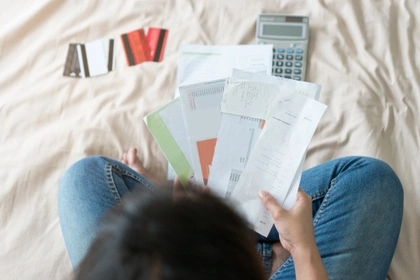What are the differences between loans and credit cards?
| Aspect | Loans | Credit Cards |
| Purpose | Typically used for larger purchases like home improvements, car financing, or debt consolidation | Flexible for various expenses and purchases, but credit limit is generally lower than the amount you can borrow with a loan |
| Interest Rates | Interest rates may be higher than credit cards if you have a low credit score. They're dependent on the amount borrowed and your repayment schedule | Interest rates may be lower than bad credit loans. Rates vary between credit card providers |
| Repayment Schedule | Set repayment schedule with a fixed term, e.g. 1 to 7 years | Minimum monthly payments with no set term |
| Access to Funds | Lump sum accessed from the beginning | Ongoing access to funds within the credit limit |
| Early Repayment Charges | Some loans may have early repayment charges | No early repayment charges – you can pay off the balance anytime |
These differences can still vary based on the specific loan or credit card product, as well as the lender or issuer.
What to consider when deciding between a loan or a credit card
1. How much do I need to borrow?
If you need to borrow a low amount, a credit card may be suitable. There are lenders who offer credit cards for bad credit, but your spending limit will likely be on the low side.
If you need to borrow a higher amount, a loan may be the better option. However, it’s important to remember if you're borrowing more, you should be confident you can meet your repayment schedule to avoid further debt and interest.
Whether you choose a loan or a credit card, you should be mindful of only borrowing what you can afford to pay back.
Each application you make leaves a mark on your report. It's always a good idea to shop around and do a free credit check before applying for credit, so you’ll know what your chances of being accepted are without further harming your credit score.
2. Will a loan or credit card be cheaper?
Whether a loan or credit card is cheaper will depend on the lender and the APR you’re offered.
The APR (annual percentage rate) is the total cost of borrowing over a year. It’s shown as a percentage and includes all interest and charges. Your credit score and personal financial situation will impact the APR you’re offered on both loans and credit cards.
Credit cards with interest-free periods can be one of the cheapest ways to borrow if you can repay in full before the interest-free period ends. Interest-free cards are often reserved for those with higher credit scores, so if you have bad credit, you may not be eligible.
You can typically borrow more with a loan than a credit card. However, you may pay more in total interest, depending on the APR and length of your loan.
Use eligibility checkers (also known as soft search tools) to have a look at all options before committing to an application.
What loans can I get with bad credit?
A secured loan (also known as a homeowner loan) is a loan that is secured against your house.
-
Typically lower interest rates than unsecured loans but come with the risk of your house being repossessed.
-
Likely to be able to borrow more with secured loans and have more time to pay them back.
-
Longer terms usually mean paying more interest overall. There is also added risk, as your house may be repossessed if you don’t keep up with repayments.
An unsecured loan (also known as a personal loan) is not secured against a house.
-
Interest rates are generally higher than secured loans. Your interest rate is also likely to be higher when you have poor credit.
-
Unsecured loans come without immediate risk to your home. If you miss a payment, your credit score will be damaged, but your property will be unaffected. However, if missed payments lead to legal action, such as an IVA or bankruptcy, your property could still be at risk.
When applying for any type of loan, you want to be confident you can make your repayments each month. Missed payments could lead to damage to your credit report, fees, and, in the case of secured loans, your home being repossessed.
There are lenders who specialise in making both secured loans and unsecured loans available for people with bad credit, so you could consider either option, depending on your circumstances.
Can I get a credit card with bad credit?
As credit cards aren’t secured against property, and the debt can’t be covered by a guarantor, your eligibility is based on your own ability to pay and your previous history with credit. If this is less than ideal, you will probably find that many lenders may limit your options.
Despite that, there are lenders who specialise in credit cards for those with poor credit. Just make sure that you’re only borrowing manageable amounts of money and making payments regularly and on time, as this will improve your credit score.
If I am rejected for one, can I apply for the other?
You can make a second application for credit if you are rejected. However, your chances of being accepted may be lower after a rejected application.
If your application for a loan or credit card is rejected, it’s best to wait between 3-6 months before starting another. This is because every complete credit application you make shows up on your file, and lenders may view multiple applications as evidence that you are desperate for credit.
It’s a good idea to use an eligibility checker for any type of application first, so you can have a better idea of whether you’ll be accepted before you apply. This way you’re guaranteed to get your card without risking an unnecessary mark on your credit report.
What happens if I am refused for both?
When you’ve been turned down for both a credit card and loan, this can be frustrating.
Consider working out a plan to start improving your credit score, if your reasons for borrowing aren’t urgent. This way, you can improve your score without getting into unmanageable debt and increase your eligibility.
If you’re struggling with debt, you can access free financial advice and support from a professional debt specialist. Visit Money Wellness, StepChange, Citizens Advice, National Debtline, or MoneyHelper to find out more.
Ocean Credit Card
See if it's a YES before you apply
- Up to £1,500 credit limit
- Checking won't affect your credit score
- Get a response in 60 seconds
39.9% APR
Representative (variable)
Intelligent Lending Ltd (credit broker). Capital One is the exclusive lender.

Disclaimer: We make every effort to ensure content is correct when published. Information on this website doesn't constitute financial advice, and we aren't responsible for the content of any external sites.






